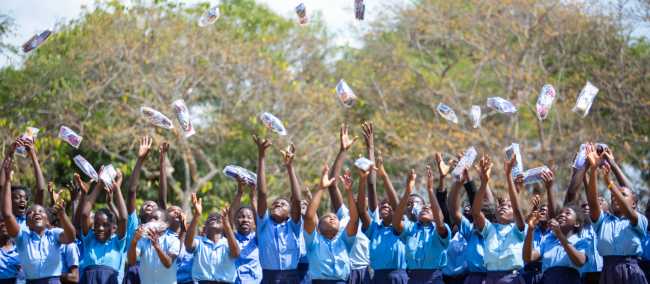
Menstrual Pad Project | Unknown
Blog home / Regenerative 2030: Community-Led Projects
Regenerative 2030: Community-Led Projects Changing the Way We Travel
Travel has the power to open minds, build bridges and inspire change. But what if it could also restore ecosystems, support communities and leave places better than we found them?
That is the idea behind Regenerative 2030, a long-term initiative by the World Expeditions Travel Group that goes beyond sustainability. It is about regeneration. That means actively improving the places we visit by supporting community-led projects that address environmental, social and cultural challenges.
Through the World Expeditions Foundation, Regenerative 2030 is funding a growing portfolio of grassroots projects around the globe. These are not charity handouts. They are partnerships. Each one is led by local people, built on trust, and designed for long-term impact. Every project is carefully chosen to align with the United Nations Sustainable Development Goals and the needs of the communities involved.
And it is easy for travellers to contribute. For every booking made, we donate funds to Regenerative 2030. It is a small contribution that supports local leadership, encourages grassroots action, and helps deliver measurable change.
1. Biosand School Water Filter Project (Guatemala)
In the village of Xeparquiy, access to clean drinking water is limited. This project provides a large biosand water filter and multiple handwashing stations for the local school. Led by Guatemalan NGO The Good Neighbours, the filters are based on traditional Mayan water purification methods. Students gain access to safe drinking water, which helps reduce illness and improve school attendance. Hygiene training and regular water testing are also included to ensure long-term benefits.
2. Combating Plastic Waste in Bali’s Rivers (Indonesia)
Plastic pollution in Indonesia's rivers is a major contributor to ocean waste. In Bali, the NGO Sungai Watch is addressing the issue by installing floating river barriers to trap plastic before it reaches the sea. This project supports the installation and maintenance of one mini barrier, creates local employment for waste collection and sorting, and funds education programs about waste management. It helps protect ecosystems and builds environmental awareness in nearby communities.
3. Improving Literacy through Book Provision (Botswana)
In Maun, a local author is improving literacy through a grassroots reading and tutoring program. This project provides 360 books for Year 4 to Year 6 students and supports after-school tutoring led by trained youth and women. The books reflect local culture and language, helping children connect with stories that feel relevant to their lives. The program not only improves literacy but also supports youth employment and family engagement.
4. Marine Protected Area in the Azores (Portugal)
Risso’s dolphins in the Azores are facing pressure from climate change and competition for food. Marine biologist Karin Hartman has spent years tracking their behaviour. This project funds satellite tagging to monitor their movements and better understand how to protect them. The research supports the creation of a new Marine Protected Area and has already helped change tourism practices on Pico Island. Whale watching companies are shifting to more sustainable approaches as a result.
5. Menstrual Packs for Equal Rights (Zambia)
Many girls in rural Zambia miss school during their periods due to lack of access to safe menstrual products. The Ufulu Project provides reusable menstrual packs made from breathable fabrics and includes education about menstrual health. Each kit can be used for up to two years. The project helps girls stay in school, reduces stigma, and creates employment for local women who sew the packs. It improves health, confidence, and long-term opportunities for girls in the region.
6. Restore Key Wetlands and Uru Uru Lake (Bolivia)
Uru Uru Lake is a Ramsar-listed wetland in Bolivia that has been severely damaged by mining and plastic pollution. A local group known as the Uru Uru Team is restoring the lake by building floating rafts made from collected plastic and planting native totora reeds that naturally filter heavy metals. The project also supports a community garden, environmental education, and advocacy to push for stronger protections. It is helping to restore biodiversity, food security, and cultural identity for seven Indigenous communities.
7. Restoring Skiddaw Forest in Cumbria (England)
Despite its name, Skiddaw Forest has few trees. Years of degradation have stripped the land of biodiversity. This restoration project, led by Cumbria Wildlife Trust, aims to return the area to a healthy ecosystem by planting 620 acres of native Atlantic rainforest, restoring peatlands, and recreating heathland habitats. The goal is to reintroduce native species, store carbon, and improve access to nature. The project will take decades but is already creating momentum for landscape-scale restoration across northern England.
The Future of Regenerative Travel
These seven projects are just the beginning. Regenerative 2030 is growing every year through donations from the World Expedition Travel Group. From clean water in Guatemala to rainforest restoration in the United Kingdom, these projects show what is possible when we support communities that are already leading change.
Every booking helps make this work possible. When we travel with care and intention, we can protect what matters and help build a better world. Regenerative 2030 invites us to go beyond leaving no trace and instead to leave something positive behind.